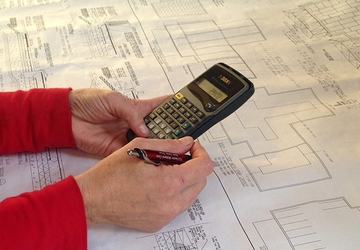Buying your first home is like sailing on an exciting adventure—full of excitement, anticipation, and maybe a little nervousness. It's a monumental step that opens the door to a world of possibilities and a place you can call your own. Amongst the sea of real estate advice, we wanted to offer you three not-so-typical tips to guide you through the maze of choices and decisions. So, buckle up and let’s explore the uncharted territory of buying your first home from a new perspective!
- Set a realistic budget: more than just numbers

You've probably heard this tip before, but let's take a closer look. Creating a budget is more than just crunching numbers; It's about balancing your dreams with financial reality. First, determine your total monthly income and expenses. Don’t forget to consider the hidden costs of homeownership, such as maintenance, property taxes and insurance. Once you have a clear idea of your financial situation, you can decide on a comfortable monthly mortgage payment.
Remember: It's not just what the bank says you can afford; it's what you can afford. It’s about what you’re willing to pay each month without sacrificing your lifestyle. Sure, that dream home with double staircases and a backyard oasis might be tempting, but maybe it's time to reconsider whether that means living off ramen noodles for the next 30 years.
- Explore different communities: there’s more than meets the eye
When looking for your first home, don’t narrow your sights on one particular neighborhood. Of course, everyone wants to live in the trendiest area, but there’s more to neighborhoods than just Instagram-worthy cafes. Take the time to explore different neighborhoods while also considering factors beyond aesthetics. Consider your daily commute, local amenities and community feel. Is this a family-friendly place or is the nightlife more lively? Learn about local schools, crime rates and future development plans. Attend community events or chat with neighbors to learn more about the area's personality. Finding the right neighbor is like dating - it's compatibility that matters, not just looks.
- Don’t Skip the Home Inspection: House Whisperers
You found the "right thing" and it looks perfect. But before you sign on the dotted line, seek help from a home inspector. Think of them as home ownership superheroes, revealing hidden truths about your potential new place to live. A home inspection is more than just superficial—it's like a thorough health check of your home. Inspectors dig into details from the foundation to the roof to check for potential problems that could turn your dream home into a money pit.
They'll spot warning signs like water damage, wiring errors, or plumbing nightmares, giving you the knowledge you need to make an informed decision. Don’t let the pretty exterior put you off – every house has its own character. The key is to understand what you're getting yourself into. If an inspection reveals minor issues, it doesn't mean you should move on. Instead, you can use these insights to negotiate repairs or a lower price with the seller. It’s all about making sure your dream home doesn’t turn into a DIY disaster.
- Understand your mortgage options: More than just the interest rate
Choosing a mortgage is like choosing the right pair of shoes – it has to be comfortable to wear over the long term. Don't just focus on the interest rate; consider which type of mortgage fits your financial goals and lifestyle. Start by understanding the basic types of mortgages—fixed-rate mortgages and adjustable-rate mortgages. Fixed-rate mortgages provide stable monthly payments and make budgeting a breeze.
Conversely, an adjustable-rate mortgage (ARM) may be riskier, but may have a lower initial interest rate. Consider your plans and how long you plan to stay in your home - a fixed-rate mortgage may be a safer option if you're sticking with it for the long term. Don’t forget to make a deposit, too. While the standard 20% down payment is ideal, there are lower down payment options, such as: B. FHA loans. However, a smaller down payment may result in higher monthly payments or additional mortgage insurance costs.
- Consider Resale Value: Real Estate’s Crystal Ball

Your first home may not be your forever home, and that's okay. When imagining life in your new space, consider resale value. Life is unpredictable, and circumstances may cause you to sell your home sooner than expected. Look for features that will appeal to a broad audience, such as: B. A functional layout, good daylight and well-maintained gardens. Be wary of overly customized decor, which may only appeal to a niche market. It's like buying a car: the more attractive it is to potential buyers, the higher the resale value. Research market trends in the area—are home prices rising or falling in this neighborhood? A little forethought can go a long way in helping your investments grow over time.
- Get pre-approved for a mortgage: The golden ticket
Picture this: You find your dream home, but someone else swoops in and snatches it from you because they were better prepared. To avoid this heartache, get pre-approved for a mortgage before you start looking for a home. Pre-approval is like a golden ticket in the real estate world. It shows sellers that you are a serious and qualified buyer and gives you a competitive advantage.
Plus, it can help you create a more realistic budget so you don’t waste time falling in love with a home that’s beyond your means. To get pre-approved, gather your financial documents - pay stubs, tax returns and credit history. Contact a mortgage lender to find out how much you can borrow. This advance information simplifies the buying process and gives you the confidence to make a quick, informed decision when you find the right home.
Conclusion
The journey to becoming a homeowner is an exciting adventure that requires careful consideration and flexibility. By setting a realistic budget, exploring different neighborhoods, not skipping home inspections, understanding your mortgage options, considering resale value, and getting pre-approved, you'll have a well-rounded toolkit to navigate the real estate landscape. Remember, every step is a stepping stone on the road to finding a home that meets your current needs and long-term goals.


